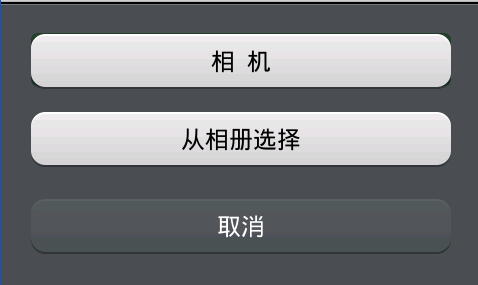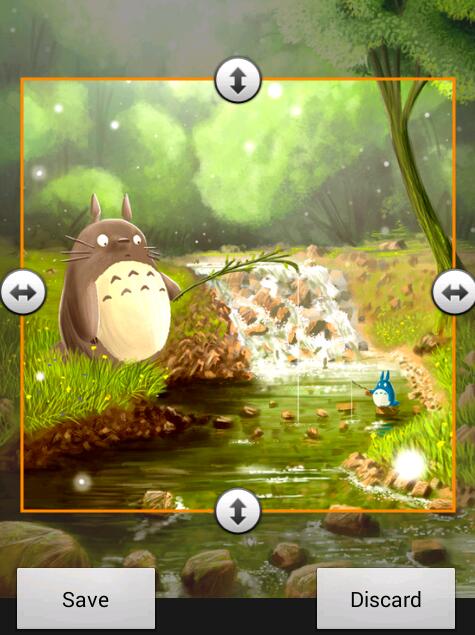
- Android采取BroadcastReceiver方式自动获取验证码
- Android App中使用ViewPager+Fragment实现滑动切换效果
- Android Navigation TabBar控件实现多彩标签栏
- 如何使用Android实现接口实信息在留言板显示
- Android RecyclerView艺术般的控件使用完全解析
- android通过gps获取定位的位置数据和gps经纬度
- Android 中 Fragment的使用大全
- Android自定义控件简单实现侧滑菜单效果
- 深入Android 五大布局对象的应用
- android开发之调用手机的摄像头使用MediaRecorder录像并播放
- Android SearchView搜索框组件的使用方法
- Android 使用Shell脚本截屏并自动传到电脑上
- Android变形(Transform)之Camera使用介绍
- Android实现多媒体录音笔
- Android开发 旋转屏幕导致Activity重建解决方法
- Android ViewPager实现选项卡切换
- Android TabHost组件使用方法详解
- Android应用开发之代码混淆
- Android开发入门之Notification用法分析
- 安卓APP测试之使用Burp Suite实现HTTPS抓包方法
- Android PullToRefreshLayout下拉刷新控件的终结者
- 深入理解Android中的Handler异步通信机制
- [Java4Android]23_抽象类和抽象函数
- android 自定义Android菜单背景的代码
- Android中使用sax解析xml文件的方法
- [Android开发视频教程]02_11_Animations的使用(四)
- Android Activity回收与操作超时处理
- Android设计登录界面、找回密码、注册功能
- Android菜单操作之创建并响应菜单
- Android App中使用Pull解析XML格式数据的使用示例
Android相机、图册demo
作者:佚名 Android开发编辑:admin 更新时间:2022-07-23
本文为大家分享了Android相机、图册基本demo,供大家参考,具体内容如下
package com.example.democamera;
import java.io.File;
import java.io.FileNotFoundException;
import java.io.IOException;
import android.net.Uri;
import android.os.Bundle;
import android.os.Environment;
import android.provider.MediaStore;
import android.app.Activity;
import android.content.Context;
import android.content.Intent;
import android.content.res.Configuration;
import android.database.Cursor;
import android.graphics.Bitmap;
import android.graphics.BitmapFactory;
import android.view.View;
import android.widget.ImageView;
public class MainActivity extends Activity {
private ImageView iv;
static final int gallery = 1, camera = 2;
@Override
protected void onCreate(Bundle savedInstanceState) {
super.onCreate(savedInstanceState);
setContentView(R.layout.activity_main);
iv = (ImageView) findViewById(R.id.iv_picture);
}
/**
* 启动图片画廊
*
* @param view
*/
public void startGallery(View view) {
Intent intent = new Intent();
intent.setAction(Intent.ACTION_GET_CONTENT);
intent.setType("image/*");
startActivityForResult(intent, gallery);
}
/**
* 启动相机
*
* @param view
*/
public void startCamera(View view) {
Intent intent = new Intent(MediaStore.ACTION_IMAGE_CAPTURE);
if (isSDExsit()) {
/* 创建存放图片文件夹 */
File dir = new File(Environment.getExternalStorageDirectory()
+ "/my");
if (!dir.exists())
dir.mkdirs();
/* 设置图片参数 得到原尺寸的图片 */
File file = new File(dir, "aaa.jpg");
intent.putExtra(MediaStore.EXTRA_SCREEN_ORIENTATION,
Configuration.ORIENTATION_UNDEFINED);
intent.putExtra(MediaStore.EXTRA_OUTPUT, Uri.fromFile(file));
}
startActivityForResult(intent, camera);
}
@Override
protected void onActivityResult(int requestCode, int resultCode, Intent data) {
// TODO Auto-generated method stub
super.onActivityResult(requestCode, resultCode, data);
switch (requestCode) {
case gallery:
/* 做判断,防止返回报错 */
if (data != null) {
/*
* 三种方式处理URI
*/
Uri uri = data.getData();
iv.setImageURI(uri);
Bitmap bitmap = BitmapFactory
.decodeFile(getPathByUri(uri, this));
iv.setImageBitmap(bitmap);
Bitmap bitmap2 = getBitmapByUri(uri, this);
iv.setImageBitmap(bitmap2);
}
break;
case camera:
if (data != null) {// 这是获得缩略图的方法
Bitmap b = (Bitmap) data.getExtras().get("data");
iv.setImageBitmap(b);
} else {// 有sd卡得到图片原图
Bitmap bitmap = BitmapFactory.decodeFile("sdcard/my/aaa.jpg");//直接这样做会有发生OOM的风险,Demo简单这么处理
iv.setImageBitmap(bitmap);
}
break;
default:
break;
}
}
/**
* Uri-->Bitmap
*
* @param uri
* @param context
* @return
*/
public static Bitmap getBitmapByUri(Uri uri, Context context) {
Bitmap bitmap = null;
try {
bitmap = MediaStore.Images.Media.getBitmap(
context.getContentResolver(), uri);
} catch (FileNotFoundException e) {
// TODO Auto-generated catch block
e.printStackTrace();
} catch (IOException e) {
// TODO Auto-generated catch block
e.printStackTrace();
}
return bitmap;
}
/**
* Uri--->Path
*
* @param uri
* @param context
* @return
*/
public static String getPathByUri(Uri uri, Context context) {
String path = null;
String[] projection = { MediaStore.Images.Media.DATA };
Cursor cursor = context.getContentResolver().query(uri, projection,
null, null, null);
if (cursor.moveToFirst()) {
int index = cursor
.getColumnIndexOrThrow(MediaStore.Images.Media.DATA);
path = cursor.getString(index);
}
return path;
}
/**
* 判断SD卡是否存在
*
* @return
*/
public static boolean isSDExsit() {
if (Environment.getExternalStorageState().equals(
Environment.MEDIA_MOUNTED)) {
return true;
} else {
return false;
}
}
}
下面分享具体Android 调用相机、打开相册、裁剪图片的实现代码,内容如下
private ImageView iv_user_photo;
private String fileName = "";
private File tempFile;
private int crop = 300;// 裁剪大小
private static final int OPEN_CAMERA_CODE = 10;
private static final int OPEN_GALLERY_CODE = 11;
private static final int CROP_PHOTO_CODE = 12;
private OnClickListener PopupWindowItemOnClick = new OnClickListener() {
@Override
public void onClick(View v) {
menuWindow.dismiss();
switch (v.getId()) {
// 拍照
case R.id.btn_camera:
initFile();
openCamera();
break;
// 相册
case R.id.btn_gallery:
initFile();
openGallery();
break;
default:
break;
}
}
};
public void initFile() {
if(fileName.equals("")) {
if(FileUtil.existSDCard()) {
String path = Environment.getExternalStorageDirectory() + File.separator + "JanuBookingOnline" + File.separator;
FileUtil.mkdir(path);
Logger.i("path:" + path);
fileName = path + "user_head_photo.jpg";
tempFile = new File(fileName);
} else {
CommonUitl.toast(context, "请插入SD卡");
}
}
}
/**
* 调用相机
*/
public void openCamera() {
Intent intent = new Intent(MediaStore.ACTION_IMAGE_CAPTURE);// 打开相机
intent.putExtra("output", Uri.fromFile(tempFile));
startActivityForResult(intent, OPEN_CAMERA_CODE);
}
/**
* 打开相册
*/
public void openGallery() {
Intent intent = new Intent(Intent.ACTION_PICK);// 打开相册
intent.setDataAndType(MediaStore.Images.Media.INTERNAL_CONTENT_URI, "image/*");
intent.putExtra("output", Uri.fromFile(tempFile));
startActivityForResult(intent, OPEN_GALLERY_CODE);
}
/**
* 裁剪图片
* @param uri
*/
public void cropPhoto(Uri uri) {
Intent intent = new Intent("com.android.camera.action.CROP");
intent.setDataAndType(uri, "image/*");
intent.putExtra("output", Uri.fromFile(tempFile));
intent.putExtra("crop", true);
intent.putExtra("aspectX", 1);
intent.putExtra("aspectY", 1);
intent.putExtra("outputX", crop);
intent.putExtra("outputY", crop);
startActivityForResult(intent, CROP_PHOTO_CODE);
}
@Override
protected void onActivityResult(int requestCode, int resultCode, Intent data) {
if (resultCode == 1)
return;
switch (requestCode) {
case OPEN_CAMERA_CODE:
cropPhoto(Uri.fromFile(tempFile));
break;
case OPEN_GALLERY_CODE:
cropPhoto(data.getData());
break;
case CROP_PHOTO_CODE:
try {
BitmapFactory.Options options = new BitmapFactory.Options();
options.inSampleSize = 2;
Bitmap bitmap = BitmapFactory.decodeFile(fileName, options);
if (bitmap != null) {
iv_user_photo.setImageBitmap(bitmap);
CommonUitl.sharedPreferences(context, AppConstants.USER_PHOTO, fileName);
}
} catch (Exception e) {
e.printStackTrace();
}
break;
default:
break;
}
super.onActivityResult(requestCode, resultCode, data);
}



以上就是关于Android相机、图册的基本操作内容,希望对大家学习Android软件编程有所帮助。
- 上一篇文章: Android自定义加载控件实现数据加载动画
- 下一篇文章: Android程序开发之手机APP创建桌面快捷方式
- Android录音应用实例教程
- Android getSystemService用法实例总结
- 实例解析Android ImageView的scaleType属性
- Android判断网络类型的方法(2g,3g还是wifi)
- android工程下不能运行java main程序的解决
- 探讨:如何修改Android超时休眠时间
- Android中EditText光标在4.0中的bug及解决方